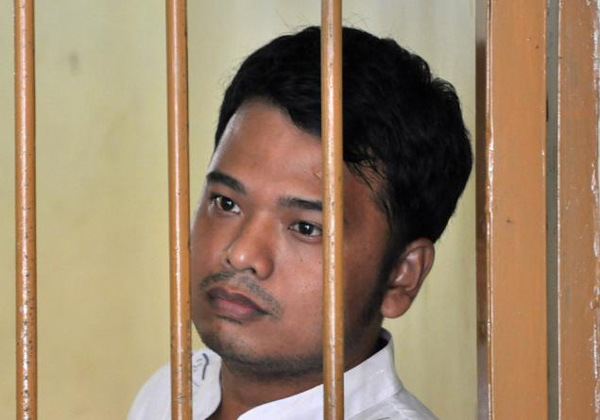
What the law says:
Article 156a of the Indonesian Penal Code
By a maximum imprisonment of five years shall be punished any person who deliberately in public gives expression to feelings or commits an act.
a) which principally have the character of being at enmity with, abusing or staining a religion, adhered to in Indonesia;
b) with the intention to prevent a person to adhere to any religion based on the belief of the almighty God.
ArticIe 176 of the Indonesian Penal Code
Any person who by causing disorder or making noise with deliberate intent obstructs either a lawful public religious meeting, or a lawful religious or funeral ceremony, shall be punished by a maximum imprisonment of one month and two weeks or a maximum fine of hundred and twenty Rupiahs.
Article 177 of the Indonesian Penal Code
By a maximum imprisonment of four months and two weeks or a maximum fine of one hundred and twenty Rupiahs shall be punished:
1st, any person who ridicules a minister of the religion in the lawful observation of his service;
2nd-ly, any person who jeers at objects dedicated to a divine worship, where and when the exercise of said worship is lawful.
Article 28E of the Indonesian Constitution
(1) Every person shall be free to choose and to practice the religion of his/her choice, to choose one's education, to choose one's employment, to choose one's citizenship, and to choose one's place of residence within the state territory, to leave it and to subsequently return to it.
(2) Every person shall have the right to the freedom to believe his/her faith and to express his/her views and thoughts, in accordance with his/her conscience.
(3) Every person shall have the right to the freedom to associate, to assemble and to express opinions.
Article 28I of the Indonesian Constitution
(4) The rights to life, freedom from torture, freedom of thought and conscience, freedom of religion, freedom from enslavement, recognition as a person before the law, and the right not to be tried under a law with retrospective effect are all human rights that cannot be limited under any circumstances.
Article 29 of the Indonesian Constitution
(1) The State shall be based upon the belief in the One and Only God.
(2) The State guarantees all persons the freedom of worship, each according to his/her own religion or belief.
How the law is used:
Over 90% of its 240 million citizens are Muslims, the majority belonging to the Sunni denomination. This number may not reflect the reality though, as the government has made it difficult to deviate from the norm in one’s belief: the Indonesian state only recognises six religions: Islam, Catholicism, Protestantism, Buddhism, Hinduism and Confucianism. Official recognition means that one of these faiths must appear on any citizens ID card and therefore will also be listed as the person’s belief. This clearly skews the numbers, and tramples on the rights of believers of other religions, not to mention atheists. The country’s penal code also endorses uniform faith, as it holds several articles criminalising blasphemy towards the recognised religions. The constitution, under the founding Pancasila ideology, also stipulates that the basis of the Indonesian state is the belief in “the One and Only God”.
Blasphemy convictions are not uncommon in Indonesia, and the majority of them are, unsurprisingly, for offences towards Islam. Atheists (who officially do not exist, as their IDs will include a religion) have recently become popular targets of blasphemy accusations. In 2012 Alexander Aan, a vocal atheist, was arrested for blasphemy. He had moderated an atheist page on Facebook on which he posted statements such as “God does not exist”, and comical images of the Prophet Muhammad. One day Aan was recognised on the street and beaten by a mob. He was then taken into “protective custody” and later charged with “disseminating information aimed at inciting religious hatred or hostility”, “religious blasphemy”, and “calling for others to embrace atheism”. He was later badly beaten in prison by inmates who had been informed of his charges. He faced up to 11 years imprisonment, as the blasphemy charges carry a maximum of five years imprisonment, and in Aan’s case a possible additional 6 years could have been given for spreading blasphemy over the internet. Eventually, Aan stated that he regretted his actions and has allegedly also re-converted to Islam. Such actions apparently softened the judge’s verdict: Aan was finally acquitted of the general blasphemy charges for showing remorse, but convicted to 2 years and 6 months imprisonment, and a fine of Rp 100 million (£6,640) for “defaming Islam and insulting the Prophet Muhammad through his Facebook account”. Similar convictions have since been given to other atheists who have been vocal online.
Pancasila (five principles), is held as the foundation of the Indonesian state. The first of these principles is the belief in one supreme God, as set out in the constitution. It could be argued that this principle makes atheism illegal and unconstitutional. Then again, atheism, if considered a belief system, ought to be protected under the religious freedom article of the constitution, although the article is increasingly ignored by the authorities. In any case, atheists are not popular in Indonesia. This is partly due to the association of atheism with communism.
For three decades Indonesia was ruled by President Suharto, whose politics were heavily anti-communist in contrast those of the country’s first president, the authoritarian General Sukarno, whose rule depended on the powerful Communist Party. Suharto came to power in 1965, by severing this connection in a violent coup, aided by Islamists who participated in mass-killings of “godless communists”. During Suharto’s presidency, millions of people were jailed for communism, and Islamists gained considerable power. Suharto remained in office until 1998, after which Indonesia embarked on a route to political reform. The Suharto period nevertheless installed Pancasila as the basis of the state, gave power to rising extremist Islamist factions and installed a suspicion of atheist communists in the minds of the citizens.
Besides atheists, minority religious groups frequently face oppression. Some Christian sects have been banned from building churches, and some already constructed have been demolished. Even devout Muslims are not safe from religious persecution, especially if they deviate from the mainstream Sunni opinions. In 2012, a Shia cleric was sentenced to two years’ imprisonment for blasphemy: Tajul Muluk had allegedly taught that it is acceptable for a Muslim to only pray three times a day and not undertake a pilgrimage to Mecca, which according to his accusers caused “public anxiety”.
Muslim minorities often face oppression and even violent attacks from extremist Islamist, who the government seems unwilling to rein in. In 2011 Islamists attacked an Ahmedi Muslim community, torching the village and hacking three people to death. Twelve islamist militants were convicted and sentenced to 3-6 months imprisonment, conspicuously shorter than any of the sentences for those convicted of blasphemy.
In April, five high school students, all girls, were charged with “tainting religion”. The girls had recorded a video on a mobile phone in which they alternately dance and perform prayer movements to an American pop song. The video went viral, and was finally seen by the girls’ schools’ principal, who reported them to the police “for fear of public outcry” after consulting with the local Ulema Council. A police chief commented: “The school and members of the community were offended by the video and felt it insulted Islam”. The girls were expelled from school, which means that they will be unable to take an important national exam and may thus not be able to graduate. They will face a juvenile court and other charges may still be added.
The government continues to insist that “religious harmony” in Indonesia is strong, yet It has been reported that religious conflict is on the rise, as are accusations of blasphemy.The limited number of recognised religions and the insistence on the Pancasila-inspired Islamic nature of the country have created an unequal society where Islamists are empowered to act with impunity, minorities are terrorised and atheists are persecuted.
But there have been some recent positive steps. The government has discussed introducing the option of leaving the religion box on the ID card empty, as a concession to minorities, but no decision has yet been made. On the atheist front a group of Indonesian atheists have established an “Ask an Atheist” website, where people can pose questions for atheists to answer in a non-confrontational manner. Such initiatives hopefully signal a more tolerant future for Indonesian atheists.
What you can do:
You can sign a petition calling for Alex Aan's immediate release and charges to be brought on the people who violently attacked him, here http://www.change.org/id/petisi/drop-charges-against-alex-aan-for-blaspheming-islam

